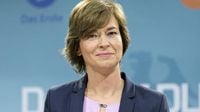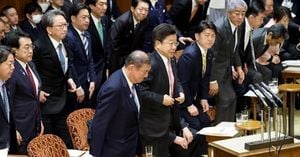Maybrit Illner, a stalwart of German political talk shows, has been captivating audiences on ZDF for over two decades. Each week, she tackles pressing issues that resonate with the German populace, seeking straightforward answers to complex questions. The next episode of her show is set to air on Thursday, March 27, 2025, at 22:15, and promises to delve into the intricacies of coalition negotiations between the Social Democratic Party (SPD) and the Christian Democratic Union (CDU).
The episode, titled "Geld da, Strategie noch nicht – Kann Schwarz-Rot noch scheitern?" (Money is there, but strategy is not – Can Black-Red still fail?), will explore the critical phase of coalition talks, which have been marked by significant differences in tax and financial policy. The SPD and CDU, despite being on the brink of forming a government, face substantial ideological divides that could jeopardize their agreement.
With the backdrop of an XXL debt package, the discussion will center on who will prevail in these negotiations. Questions loom over whether CDU leader Friedrich Merz still has control over the talks and if the SPD, often viewed as the election loser, was better prepared for this moment. As Germany grapples with economic challenges, the pressing inquiry remains: how will the country emerge from its current crisis, and when will the promised political shift materialize?
Illner's first show aired on October 14, 1999, initially under the name "Berlin Mitte". The format was later renamed and extended by fifteen minutes, evolving into the well-known "Maybrit Illner". Throughout the pandemic years of 2020 and 2021, her show maintained a leading position among political talk shows in German television, attracting an average of 3.28 million viewers every Thursday at 22:15, the highest ratings since the show's inception.
Born in East Berlin in 1965, Illner's career began with a traditional journalistic training, which included a stint as a sports journalist for the DDR television from 1988. She joined ZDF in July 1992, where she initially hosted the ZDF-Morgenmagazin before taking the helm of her political talk show.
Illner's commitment to journalistic integrity has earned her numerous accolades, including the Bambi, the German Television Award, and the Golden Camera. However, she has also faced criticism, receiving the negative award "Goldene Kartoffel" in 2019 from the organization "Neue Deutsche Medienmacher*innen". This award was given due to claims that her show portrayed a distorted image of life in Germany as an immigration country, particularly criticizing her selection of guests.
In her long-standing career, Illner has only taken breaks from her show three times in 22 years: once in 2017 due to illness, again in 2018 following a family bereavement, and most recently on March 17, 2022, after testing positive for COVID-19. Each time, she was ably substituted by colleagues.
For the upcoming episode, Illner will host a diverse panel of guests, including Alexander Dobrindt from the CSU, Matthias Miersch from the SPD, Bodo Ramelow of Die Linke, Julia Jäkel, and Robin Alexander, a prominent journalist and author. This mix of political figures and experts aims to provide a comprehensive overview of the ongoing negotiations and the potential implications for Germany's future.
The show airs regularly on Thursdays at 22:15, with a repeat broadcast on the following day at 16:00 on the Phoenix channel. Additionally, viewers can catch the episode live or later via the ZDF Mediathek, where past episodes remain available for several months following their initial airing.
Illner's show is not only a platform for political discourse but also a reflection of her commitment to engaging with the public on vital societal issues. As she prepares for her upcoming episode, the anticipation builds around how the discussion will unfold and what insights will emerge from the high-stakes negotiations between the SPD and CDU.
Maybrit Illner continues to be a significant figure in German media, navigating the complexities of current affairs with a blend of critical analysis and engaging dialogue. Her ability to draw in millions of viewers each week speaks to her enduring relevance and the public's appetite for informed political discussion.








